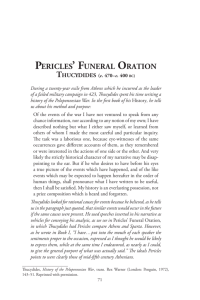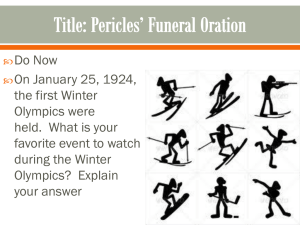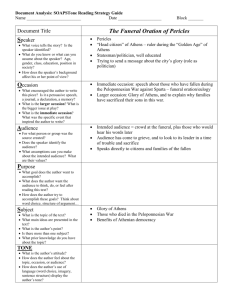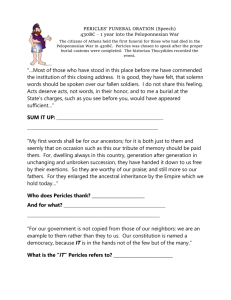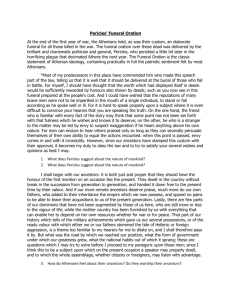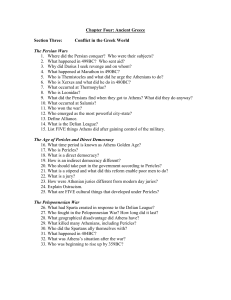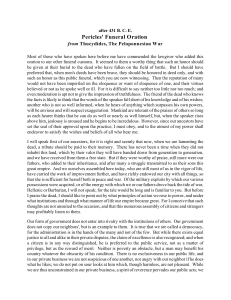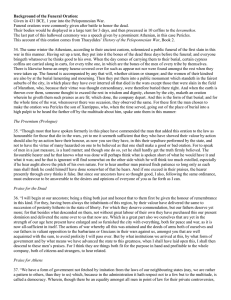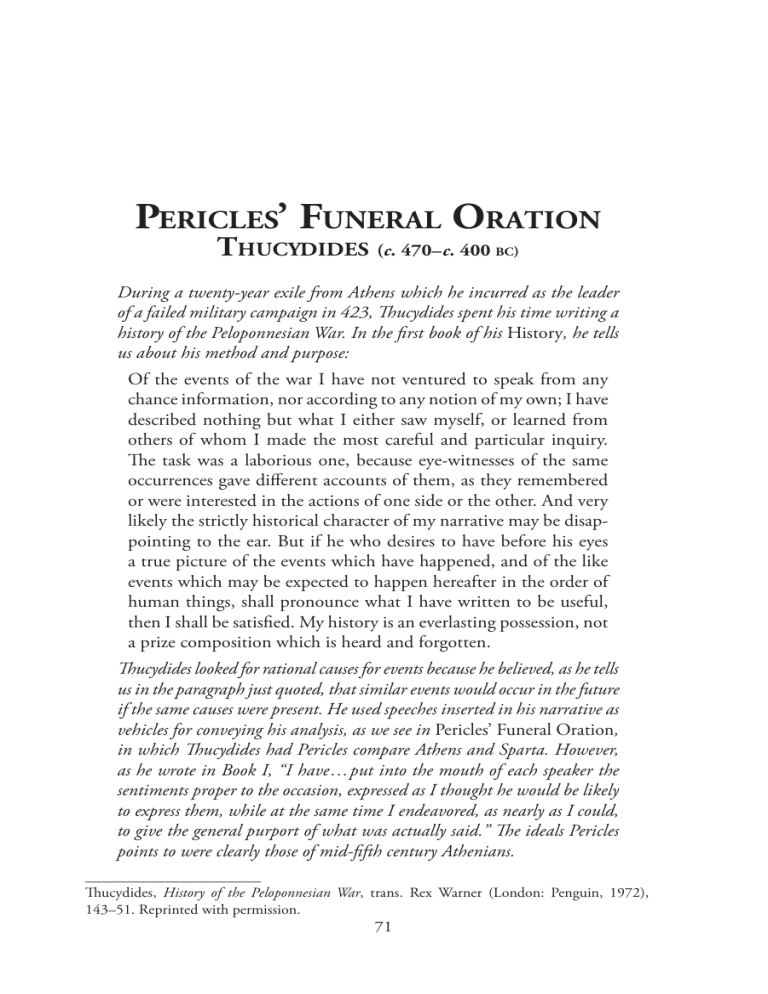
PERICLES’ FUNERAL ORATION PERICLES’ FUNERAL ORATION THUCYDIDES (c. 470–c. 400 BC) During a twenty-year exile from Athens which he incurred as the leader of a failed military campaign in 423, ucydides spent his time writing a history of the Peloponnesian War. In the first book of his History, he tells us about his method and purpose: Of the events of the war I have not ventured to speak from any chance information, nor according to any notion of my own; I have described nothing but what I either saw myself, or learned from others of whom I made the most careful and particular inquiry. e task was a laborious one, because eye-witnesses of the same occurrences gave different accounts of them, as they remembered or were interested in the actions of one side or the other. And very likely the strictly historical character of my narrative may be disappointing to the ear. But if he who desires to have before his eyes a true picture of the events which have happened, and of the like events which may be expected to happen hereafter in the order of human things, shall pronounce what I have written to be useful, then I shall be satisfied. My history is an everlasting possession, not a prize composition which is heard and forgotten. ucydides looked for rational causes for events because he believed, as he tells us in the paragraph just quoted, that similar events would occur in the future if the same causes were present. He used speeches inserted in his narrative as vehicles for conveying his analysis, as we see in Pericles’ Funeral Oration, in which ucydides had Pericles compare Athens and Sparta. However, as he wrote in Book I, “I have... put into the mouth of each speaker the sentiments proper to the occasion, expressed as I thought he would be likely to express them, while at the same time I endeavored, as nearly as I could, to give the general purport of what was actually said.” e ideals Pericles points to were clearly those of mid-fifth century Athenians. ______________________ ucydides, History of the Peloponnesian War, trans. Rex Warner (London: Penguin, 1972), 143–51. Reprinted with permission. 71 71 72 5 10 15 20 25 30 35 ANCIENT HELLAS In the same winter the Athenians, following their annual custom, gave a public funeral for those who had been the first to die in the war. ese funerals are held in the following way: two days before the ceremony the bones of the fallen are brought and put in a tent which has been erected, and people make whatever offerings they wish to their own dead. en there is a funeral procession in which coffins of cypress wood are carried on wagons. ere is one coffin for each tribe, which contains the bones of members of that tribe. One empty bier is decorated and carried in the procession: this is for the missing, whose bodies could not be recovered. Everyone who wishes to, both citizens and foreigners, can join in the procession, and the women who are related to the dead are there to make their laments at the tomb. e bones are laid in the public burial place, which is in the most beautiful quarter outside the city walls. Here the Athenians always bury those who have fallen in war. e only exception is those who died at Marathon, who, because their achievement was considered absolutely outstanding, were buried on the battlefield itself. When the bones have been laid in the earth, a man chosen by the city for his intellectual gifts and for his general reputation makes an appropriate speech in praise of the dead, and after the speech all depart. is is the procedure at these burials, and all through the war, when the time came to do so, the Athenians followed this ancient custom. Now, at the burial of those who were the first to fall in the war Pericles,1 the son of Xanthippus, was chosen to make the speech. When the moment arrived, he came forward from the tomb and, standing on a high platform, so that he might be heard by as many people as possible in the crowd, he spoke as follows: Many of those who have spoken here in the past have praised the institution of this speech at the close of our ceremony. It seemed to them a mark of honor to our soldiers who have fallen in war that a speech should be made over them. I do not agree. ese men have shown themselves valiant in action, and it would be enough, I think, for their glories to be proclaimed in action, as you have just seen it done at this funeral organized by the state. Our belief in the courage and manliness of so many should not be hazarded on the goodness or badness of one man’s speech. en it is not easy to speak with a proper sense of balance, when a man’s listeners find it difficult to believe in the truth of what one is saying. e man who knows the facts and loves the dead may well think that an oration tells less than what he knows and what he would like to hear: others who do not know so much may feel envy for the dead, and think the ______________________ 1Pericles was the leading statesman in Athens from the late 460s until his death in 429 . He presided over the transformation of the Delian League into an Athenian empire, using the tribute exacted from the Delian poleis to introduce payment for public service, to support writers and artists, and to rebuild Athenian temples destroyed during the Persian Wars. PERICLES’ FUNERAL ORATION orator over-praises them, when he speaks of exploits that are beyond their own capacities. Praise of other people is tolerable only up to a certain point, the point where one still believes that one could do oneself some of the things one is hearing about. Once you get beyond this point, you will find people becoming jealous and incredulous. However, the fact is that this institution was set up and approved by our forefathers, and it is my duty to follow the tradition and do my best to meet the wishes and the expectations of every one of you. I shall begin by speaking about our ancestors, since it is only right and proper on such an occasion to pay them the honor of recalling what they did. In this land of ours there have always been the same people living from generation to generation up till now, and they, by their courage and their virtues, have handed it on to us a free country. ey certainly deserve our praise. Even more so do our fathers deserve it. For to the inheritance they had received they added all the empire we have now, and it was not without blood and toil that they handed it down to us of the present generation. And then we ourselves, assembled here today, who are mostly in the prime of life, have, in most directions, added to the power of our empire and have organized our state in such a way that it is perfectly well able to look after itself both in peace and in war. I have no wish to make a long speech on subjects familiar to you all, so I shall say nothing about the war-like deeds by which we acquired our power or the battles in which we or our fathers gallantly resisted our enemies, Greek or foreign. What I want to do is, in the first place, to discuss the spirit in which we faced our trials and also our constitution and the way of life which has made us great. After that I shall speak in praise of the dead, believing that this kind of speech is not inappropriate to the present occasion, and that this whole assembly, of citizens and foreigners, may listen to it with advantage. Let me say that our system of government does not copy the institutions of our neighbors. It is more the case of our being a model to others than of our imitating anyone else. Our constitution is called a democracy because power is in the hands not of a minority but of the whole people. When it is a question of settling private disputes, everyone is equal before the law; when it is a question of putting one person before another in positions of public responsibility, what counts is not membership of a particular class, but the actual ability which the man possesses. No one, so long as he has it in him to be of service to the state, is kept in political obscurity because of poverty. And, just as our political life is free and open, so is our day-to-day life in our relations with each other. We do not get into a state with our next-door neighbor if he enjoys himself in his own way, nor do we give him the kind of black looks which, though they do no real harm, still do hurt people’s feelings. We are free and tolerant in our private lives; but in public affairs we keep to the law. is is because it commands our deep respect. 73 5 10 15 20 25 30 35 40 74 5 10 15 20 25 30 35 40 ANCIENT HELLAS We give our obedience to those whom we put in positions of authority, and we obey the laws themselves, especially those which are for the protection of the oppressed, and those unwritten laws which it is an acknowledged shame to break. And here is another point. When our work is over, we are in a position to enjoy all kinds of recreation for our spirits. ere are various kinds of contests and sacrifices regularly throughout the year; in our own homes we find a beauty and a good taste which delight us every day and which drive away our cares. en the greatness of our city brings it about that all the good things from all over the world flow in to us, so that to us it seems just as natural to enjoy foreign goods as our own local products. en there is a great difference between us and our opponents in our attitude towards military security. Here are some examples: Our city is open to the world, and we have no periodical deportations in order to prevent people observing or finding out secrets which might be of military advantage to the enemy. is is because we rely, not on secret weapons, but on our own real courage and loyalty. ere is a difference, too, in our educational systems. e Spartans, from their earliest boyhood, are submitted to the most laborious training in courage; we pass our lives without all these restrictions, and yet are just as ready to face the same dangers as they are. Here is a proof of this: When the Spartans invade our land, they do not come by themselves, but bring all their allies with them; whereas we, when we launch an attack abroad, do the job by ourselves and, though fighting on foreign soil, do not often fail to defeat opponents who are fighting for their own hearths and homes. As a matter of fact, none of our enemies has ever yet been confronted with our total strength, because we have to divide our attention between our navy and the many missions on which our troops are sent on land. Yet, if our enemies engage a detachment of our forces and defeat it, they give themselves credit for having thrown back our entire army; or, if they lose, they claim that they were beaten by us in full strength. ere are certain advantages, I think, in our way of meeting danger voluntarily, with an easy mind, instead of with a laborious training, with natural rather than with state-induced courage. We do not have to spend our time practicing to meet sufferings which are still in the future; and when they are actually upon us we show ourselves just as brave as these others who are always in strict training. is is one point in which, I think, our city deserves to be admired. ere are also others: Our love of what is beautiful does not lead to extravagance; our love of the things of the mind does not make us soft. We regard wealth as something to be properly used, rather than as something to boast about. As for poverty, no one need be ashamed to admit it: the real shame is in not taking practical measures to escape from it. Here each individual is interested not only in his own affairs PERICLES’ FUNERAL ORATION but in the affairs of the state as well: even those who are mostly occupied with their own business are extremely well-informed on general politics—this is a peculiarity of ours: we do not say that a man who takes no interest in politics is a man who minds his own business; we say that he has no business here at all. We Athenians, in our own persons, take our decisions on policy or submit them to proper discussions: for we do not think that there is an incompatibility between words and deeds; the worst thing is to rush into action before the consequences have been properly debated. And this is another point where we differ from other people. We are capable at the same time of taking risks and of estimating them beforehand. Others are brave out of ignorance; and, when they stop to think, they begin to fear. But the man who can most truly be accounted brave is he who best knows the meaning of what is sweet in life and of what is terrible, and then goes out undeterred to meet what is to come. Again, in questions of general good feeling there is a great contrast between us and most other people. We make friends by doing good to others, not by receiving good from them. is makes our friendship all the more reliable, since we want to keep alive the gratitude of those who are in our debt by showing continued goodwill to them: whereas the feelings of one who owes us something lack the same enthusiasm, since he knows that, when he repays our kindness, it will be more like paying back a debt than giving something spontaneously. We are unique in this. When we do kindnesses to others, we do not do them out of any calculations of profit or loss: we do them without afterthought, relying on our free liberality. Taking everything together then, I declare that our city is an education to Greece, and I declare that in my opinion each single one of our citizens, in all the manifold aspects of life, is able to show himself the rightful lord and owner of his own person, and do this, moreover, with exceptional grace and exceptional versatility. And to show that this is no empty boasting for the present occasion, but real tangible fact, you have only to consider the power which our city possesses and which has been won by those very qualities which I have mentioned. Athens, alone of the states we know, comes to her testing time in a greatness that surpasses what was imagined of her. In her case, and in her case alone, no invading enemy is ashamed at being defeated, and no subject can complain of being governed by people unfit for their responsibilities. Mighty indeed are the marks and monuments of our empire which we have left. Future ages will wonder at us, as the present age wonders at us now. We do not need the praises of a Homer, or of anyone else whose words may delight us for the moment, but whose estimation of facts will fall short of what is really true. For our adventurous spirit has forced an entry into every sea and into every land; and everywhere we have left behind us everlasting memorials of good done to our friends or suffering inflicted on our enemies. 75 5 10 15 20 25 30 35 40 76 5 10 15 20 25 30 35 40 ANCIENT HELLAS is, then, is the kind of city for which these men, who could not bear the thought of losing her, nobly fought and nobly died. It is only natural that every one of us who survive them should be willing to undergo hardships in her service. And it was for this reason that I have spoken at such length about our city, because I wanted to make it clear that for us there is more at stake than there is for others who lack our advantages; also I wanted my words of praise for the dead to be set in the bright light of evidence. And now the most important of these words has been spoken. I have sung the praises of our city; but it was the courage and gallantry of these men, and of people like them, which made her splendid. Nor would you find it true in the case of many of the Greeks, as it is true of them, that no words can do more than justice to their deeds. To me it seems that the consummation which has overtaken these men shows us the meaning of manliness in its first revelation and in its final proof. Some of them, no doubt, had their faults; but what we ought to remember first is their gallant conduct against the enemy in defense of their native land. ey have blotted out evil with good, and done more service to the commonwealth than they ever did harm in their private lives. No one of these men weakened because he wanted to go on enjoying his wealth: no one put off the awful day in the hope that he might live to escape his poverty and grow rich. More to be desired than such things, they chose to check the enemy’s pride. is, to them, was a risk most glorious, and they accepted it, willing to strike down the enemy and relinquish everything else. As for success or failure, they left that in the doubtful hands of Hope, and when the reality of battle was before their faces, they put their trust in their own selves. In the fighting, they thought it more honorable to stand their ground and suffer death than to give in and save their lives. So they fled from the reproaches of men, abiding with life and limb the brunt of battle; and, in a small moment of time, the climax of their lives, a culmination of glory, not of fear, were swept away from us. So and such they were these men—worthy of their city. We who remain behind may hope to be spared their fate, but must resolve to keep the same daring spirit against the foe. It is not simply a question of estimating the advantages in theory. I could tell you a long story (and you know it as well as I do) about what is to be gained by beating the enemy back. What I would prefer is that you should fix your eyes every day on the greatness of Athens as she really is, and should fall in love with her. When you realize her greatness, then reflect that what made her great was men with a spirit of adventure, men who knew their duty, men who were ashamed to fall below a certain standard. If they ever failed in an enterprise, they made up their minds that at any rate the city should not find their courage lacking to her, and they gave to her the best contribution that they could. ey gave her their lives, to her and to all PERICLES’ FUNERAL ORATION of us, and for their own selves they won praises that never grow old, the most splendid of sepulchers—not the sepulcher in which their bodies are laid, but where their glory remains eternal in men’s minds, always there on the right occasion to stir others to speech or to action. For famous men have the whole earth as their memorial. It is not only the inscriptions on their graves in their own country that mark them out; no, in foreign lands also, not in any visible form but in people’s hearts, their memory abides and grows. It is for you to try to be like them. Make up your minds that happiness depends on being free, and freedom depends on being courageous. Let there be no relaxation in fact of the perils of the war. e people who have most excuse for despising death are not the wretched and unfortunate, who have no hope of doing well for themselves, but those who run the risk of a complete reversal in their lives, and who would feel the difference most intensely if things went wrong for them. Any intelligent man would find a humiliation caused by his own slackness more painful to bear than death, when death comes to him unperceived, in battle, and in the confidence of his patriotism. For these reasons I shall not commiserate with those parents of the dead, who are present here. Instead I shall try to comfort them. ey are well aware that they have grown up in a world where there are many changes and chances. But this is good fortune—for men to end their lives with honor, as these have done, and for you honorably to lament them: their life was set to a measure where death and happiness went hand in hand. I know that it is difficult to convince you of this. When you see other people happy you will often be reminded of what used to make you happy too. One does not feel sad at not having some good thing which is outside one’s experience: real grief is felt at the loss of something which one is used to. All the same, those of you who are of the right age must bear up and take comfort in the thought of having more children. In your own homes these new children will prevent you from brooding over those who are no more, and they will be a help to the city, too, both in filling the empty places, and in assuring her security. For it is impossible for a man to put forward fair and honest views about our affairs if he has not, like everyone else, children whose lives may be at stake. As for those of you who are now too old to have children, I would ask you to count as gain the greater part of your life, in which you have been happy, and remember that what remains is not long, and let your hearts be lifted up at the thought of the fair fame of the dead. One’s sense of honor is the only thing that does not grow old, and the last pleasure when one is worn out with age, is not, as the poet said, making money, but having the respect of one’s fellow men. As for those of you here who are sons or brothers of the dead, I can see a hard struggle in front of you. Everyone always speaks well of the dead, and, even 77 5 10 15 20 25 30 35 40 78 ANCIENT HELLAS if you rise to the greatest heights of heroism, it will be a hard thing for you to get the reputation of having come near, let alone equaled, their standard. When one is alive, one is always liable to the jealousy of one’s competitors, but when one is out of the way, the honor one receives is sincere and unchallenged. Perhaps I should say a word or two on the duties of women to those among 5 you who are now widowed. I can say all I have to say in a short word of advice. Your great glory is not to be inferior to what God has made you, and the greatest glory of a woman is to be least talked about by men, whether they are praising you or criticizing you. I have now, as the law demanded, said what I 10 had to say. For the time being our offerings to the dead have been made, and for the future their children will be supported at the public expense by the city, until they come of age. is is the crown and prize which she offers, both to the dead and to their children, for the ordeals which they have faced. Where the rewards of valor are the greatest, there you will find also the best and brav15 est spirits among the people. And now, when you have mourned for your dear ones, you must depart.’
